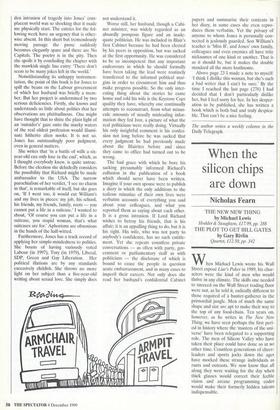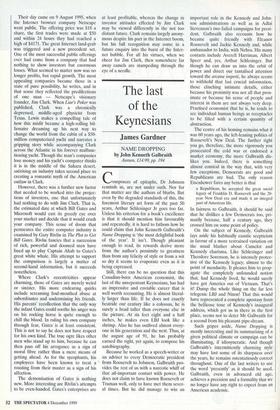When the silicon chips are down
Nicholas Fearn
THE NEW NEW THING by Michael Lewis Hodder & Stoughton, £17.99, pp. 288 THE PLOT TO GET BILL GATES by Gary Rivlin Quartet, £12.50, pp. 342
When Michael Lewis wrote his Wall Street expose Liar's Poker in 1989, his char- acters were the kind of men who would thrive in any climate. The skills one needed to succeed on the Wall Street trading floor were not, as he told it, radically different to those required of a hunter-gatherer in the primordial jungle. Men of much the same shape and size are apt to make their way to the top of any food-chain. Ten years on, however, as he writes in The New New Thing, we have seen perhaps the first peri- od in history where the 'masters of the uni- verse' have been relegated to a supporting role. The men of Silicon Valley who have taken their place could have done so at no other time. Countless generations of cheer- leaders and sports jocks down the ages have mocked these strange individuals as runts and outcasts. We now know that all along they were waiting for the day when thick glasses would correct their feeble vision and arcane programming codes would make their formerly hidden talents indispensable. Their day came on 9 August 1995, when the Internet browser company Netscape went public. The offering price was $18 a share, the first trades were made at $50 and within 24 hours they had reached a high of $4171. The great Internet land-grab was triggered and a new precedent set. One of the most successful public offerings ever had come from a company that had nothing to show investors but enormous losses. What seemed to matter now was no longer profits, but rapid growth. The most appealing companies became those in a state of pure possibility, he writes, and in that sense they reflected the predilections of one man — Netscape's visionary founder, Jim Clark. When Liar's Poker was published, Clark was a chronically depressed, middle-aged physicist from Texas. Lewis makes a compelling tale of how this misfit became a high-rolling bil- lionaire dreaming up his next way to change the world from the cabin of a $50- million computerised yacht and narrates a gripping story while accompanying Clark across the Atlantic in his forever malfunc- tioning yacht. Though the man's companies lose money and his yacht's computer thinks it is in the middle of the Sahara desert, satirising an industry takes second place to creating a romantic myth of the American outlaw in Clark.
However, there was a further new factor that needed to be worked into the projec- tions of investors, one that unfortunately had nothing to do with Jim Clark. That is, the estimated date at which Bill Gates and Microsoft would cast its greedy eye over your market and decide that it would crush your company. This sense of doom that permeates the entire computer industry is examined by Gary Rivlin in The Plot to Get Bill Gates. Rivlin fancies that a succession of rich, powerful and doomed men have lined up to play Captain Ahab to Gates's great white whale. His attempt to support the comparison is largely a matter of second-hand information, but it succeeds nonetheless.
Where Clark's eccentricities appear charming, those of Gates are merely weird or sinister. His more endearing quirks include screaming foul-mouthed abuse at subordinates and undermining his friends. His parents' recollection that the only way the infant Gates could soothe his anger was on his rocking horse is quite enough to chill the blood. In ruling his own company through fear, Gates is at least consistent. This is not to say he does not have respect for his own kind. The true ogre likes other men who stand up to him, because he can then pass off his arrogance as a sign of moral fibre rather than a mere means of getting ahead. As for the sycophants, his employees have been known to treat a roasting from their master as a sign of his affection.
The demonisation of Gates is nothing new. More interesting are Rivlin's attempts to be even-handed. Gates's enterprises are at least profitable, whereas the change in investor attitudes effected by Jim Clark may be viewed differently in the not too distant future. Clark remains largely anony- mous despite his part in the Internet boom, but his full recognition may come in a future enquiry into the burst of the Inter- net bubble. For all his virtues, when we cheer for Jim Clark, then somewhere far away camels are stampeding through the eye of a needle.



















































































 Previous page
Previous page